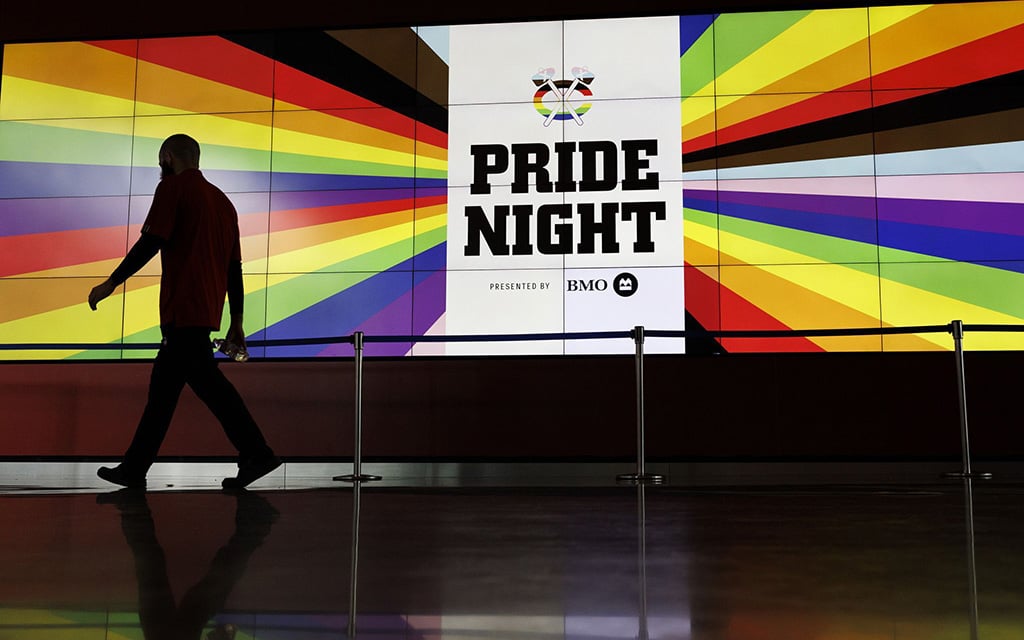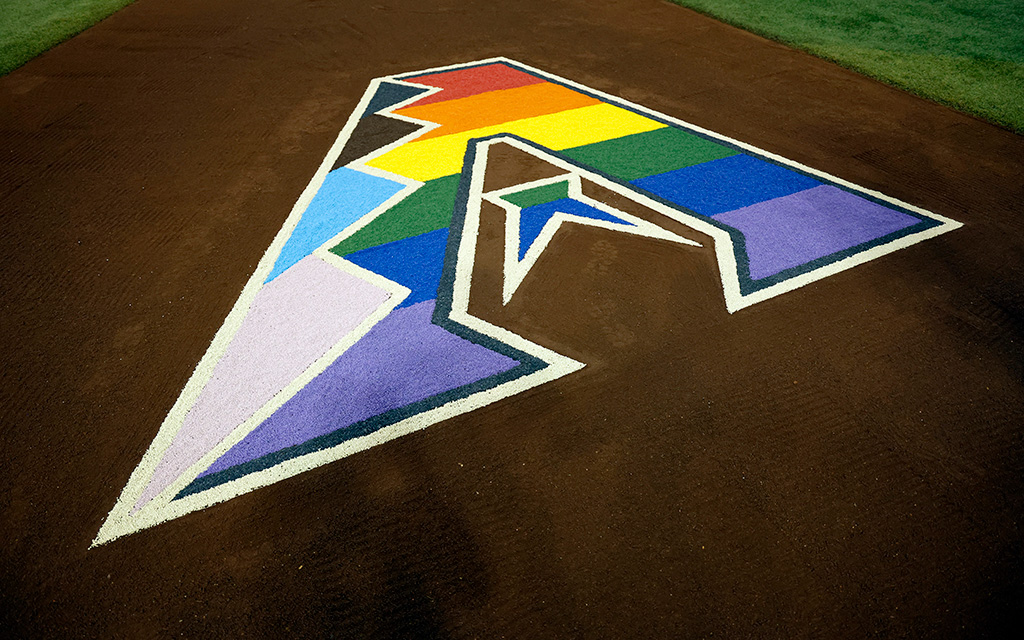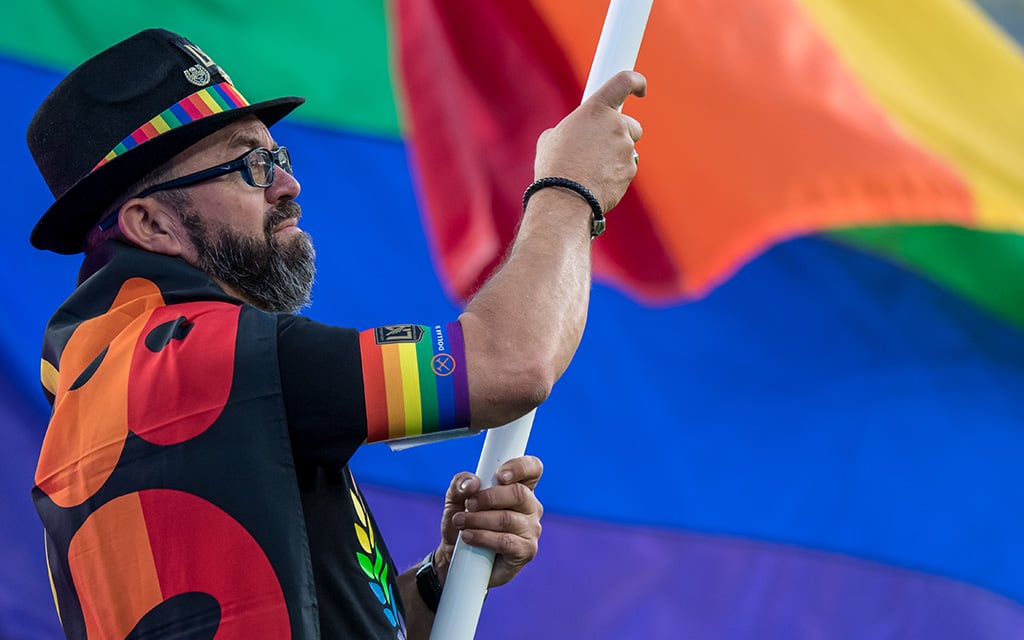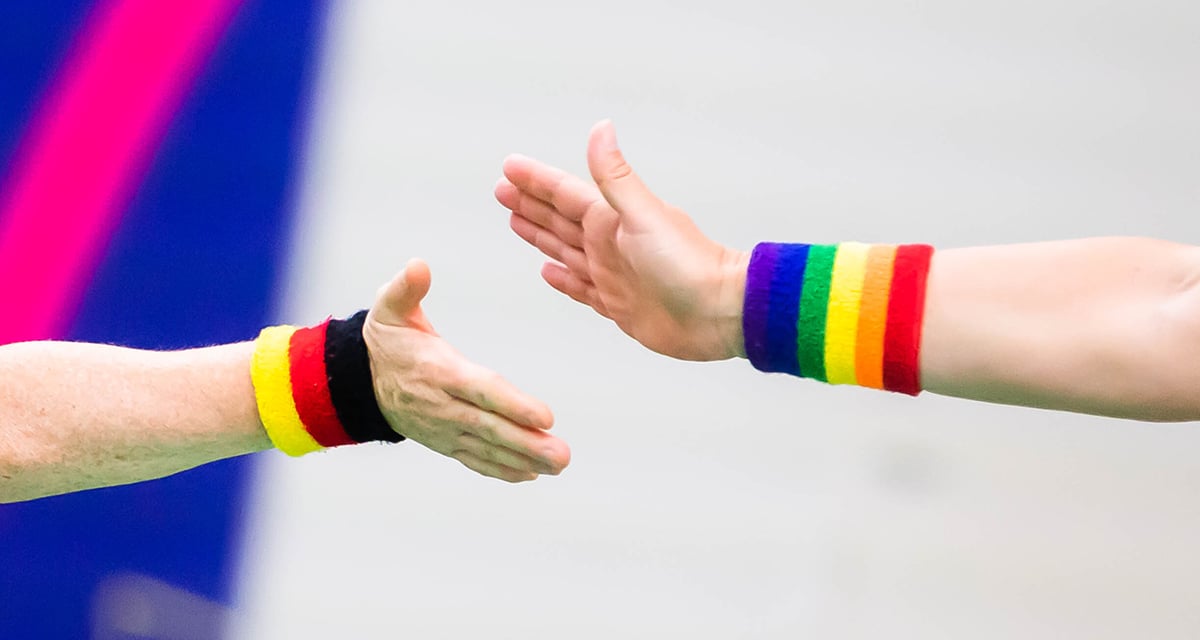
In the face of challenges, courageous athletes and advocates unite under the rainbow banner and remain determined to make Pride Night an enduring symbol of equality and progress in the world of sports. (Armando L. Sanchez/Chicago Tribune/Tribune News Service via Getty Images)
PHOENIX – The Phoenix Mercury hosted its annual Pride Night as a grand finale to the nationally celebrated Pride Month in June. The anticipation surrounding the occasion was expected considering the organization’s extensive history of supporting the LGBTQ community.
“It feels great … you feel like you’re seen, you’re represented,” Mercury center Brittney Griner said. “For them to be one of the first and still putting on a great (Pride Night), it’s just a testament to the organization and what they stand for.”
In 2014, the WNBA was the first professional league in the United States to officially recognize and market to the LGBTQ community. That same year, the Mercury became the first professional sports team in Arizona to host a Pride Night, setting an inspiring precedent.
Pride Night is not for only organizations – it is for the fans that identify as part of the LGBTQ community. The celebration is a night of recognition for the queer community and an opportunity to feel comfortable in their own skin at a sporting event. WNBA players like Mercury forward Diana Taurasi and Griner provide unique representation and visibility for the LGBTQ community seldom seen in other athletes and leagues.
“It’s very important for us because it shows as a community and as a city we’re united, and it shows inclusivity all together,” Mercury fan Matthew Gallardo said. “(Being the first organization to hold a Pride Night in Arizona) means a lot to us because it shows that they are here for the community and will stand with us no matter what.”
For all the positives Pride Night brings to stadiums, arenas and fans across the country, some leagues, teams and players are not as accepting of the tradition.
Pride Night has evolved into a divisive issue thrust into the spotlight of athletics. While some celebrate the occasion, others tip-toe around the issue by citing religion or conflicting personal values. As numerous programs and players continue to challenge Pride Night traditions, it appears that the diverse range of responses toward them shows no signs of abating.

The Arizona Diamondbacks held their sixth annual Pride Night on June 17 against the Cleveland Guardians. The first 10,000 fans received a Pride Bag courtesy of Vizzy Hard Seltzer. (Photo by Chris Coduto/Getty Images)
Trailblazers of LGBTQ inclusion
A large group of WNBA players are members of the LGBTQ community, and the league’s active efforts to be representatives of the community are a no-brainer. As of 2022, approximately 20% of the overall WNBA roster, or one player in every starting five, was publicly out as a member of the LGBTQ community, according to reports.
“Sport without the LGBTQIA+ community is incomplete,” said Mercury forward Michaela Onyenwer. “As an ally I think that is really important. A lot of our members in the WNBA are of that community.”
The NBA’s first Pride Night came in 2016 with the Portland Trailblazers and Milwaukee Bucks hosting events during the 2016-17 season. That year also marked the first time the NBA had a float participating in the New York City Pride Parade with NBA commissioner Adam Silver, WNBA president Lisa Borders and former NBA player Jason Collins, who came out as gay after retiring in 2014, were onboard.
Major League Baseball (MLB) notably held one of the first known LGBTQ-supportive nights in 1994 during the San Francisco Giants’ “Until There’s a Cure Day” to raise money and awareness during the AIDS epidemic. In 2001, the Chicago Cubs held an earlier version of Pride Night called “Gay Days.”
The Washington Commanders of the NFL held their first Pride Night in September 2021. Three former Washington players have come out as queer, more than any other NFL team. While this was the first time the NFL labeled a game as a Pride Night, the league previously held other LGBTQ-supportive events.
Resistance casts shadow over Pride Night events
In recent months, pushback from players about Pride Night has emerged more than ever before. In the NHL, dozens of players withheld their participation in Pride Night events such as Philadelphia Flyers defenseman Ivan Provorov, who refused to wear a pride-themed jersey during a pregame skate in January.
Provorov, a Russian Orthodox, was the only player who did not have a rainbow-taped stick or jersey to auction off to Flyers Charities. He cited honoring his religion as one reason for sitting out and his Russian roots, where anti-LGBTQ legislation is in place.
Nearly two months later, brothers Eric Staal and Marc Staal of the Florida Panthers declined to warm-up in the Pride Night jerseys because of their Christian beliefs.
“After many thoughts, prayers and discussions, we have chosen not to wear a Pride jersey,” the Staal brothers said in a joint statement. “We carry no judgment on how people choose to live their lives and believe that all people should be welcome in all aspects of the game of hockey. Having said that, we feel that by wearing a Pride jersey it goes against our Christian beliefs.”

Amidst pushback, enthusiastic fans proudly display their rainbow flags at a vibrant Pride Night celebration, demonstrating solidarity and support for LGBTQ+ representation in sports. (Photo by Shaun Clark/Getty Images)
Shortly after these instances, during Pride Month, the NHL announced the end of Pride Night with theme-night jerseys due to the lack of participation overshadowing its inclusive efforts. In total, seven players in the NHL chose not participate in Pride Night events during the 2022-23 season.
“We’re keeping the focus on the game and on these specialty nights, we’re going to be focused on the cause,” NHL commissioner Gary Bettman said in an interview with Sports Net. “The only difference will be we’re not going to change jerseys for warm up because that’s just become more of a distraction from really the essence of what the purpose of these nights are.”
Much like the NHL, dozens of MLB players opted out of Pride Night during the 2022 and 2023 seasons while participants wore jerseys with rainbow patches on the sleeves or rainbow logos on their caps.
Tampa Bay Rays pitcher Jason Adams is one of several players who chose not to sport the Pride patch on his jersey, stating it violated his faith and beliefs.
“It’s a hard decision because ultimately we all said what we want is them to know that all are welcome and loved here,” Adams told Tampa Bay Times last season. “But when we put it on our bodies, I think a lot of guys decided that it’s just a lifestyle that maybe — not that they look down on anybody or think differently — it’s just that maybe we don’t want to encourage it if we believe in Jesus, who’s encouraged us to live a lifestyle that would abstain from that behavior.”
The Sisters of Perpetual Indulgence is a name that made headlines during the Los Angeles Dodgers’ Pride Night in June. The “satirical drag troupe,” which is believed to be anti-Catholic, were honored on the field prior to the game’s first pitch, but not without protests against the team’s choice to support the group.
“As a devout Catholic, I am deeply troubled by the Dodgers’ decision to re-invite and honor the group ‘The Sisters of Perpetual Indulgence’ at their Pride Night this year,” tweeted Trevor Williams of the Washington Nationals. “To invite and honor a group that makes a blatant and deeply offensive mockery of my religion, and the religion of over 4 million people in Los Angeles county alone, undermines the values of respect and inclusivity that should be upheld by any organization.”
Pride Night games are held by 29 of the 30 MLB teams, with the Texas Rangers being the sole exception. Although the Rangers do not hold Pride Night, the organization shows support for the LGBTQ community as platinum sponsors for the North American Gay Amateur Athletic Alliance’s Gay Softball World Series.
A small but not absent population of detractors is women opposed to Pride Night. Jaelene Daniels, a North Carolina Courage defender from the NWSL, is no stranger to outwardly homophobic behavior, but this took full form when she refused to play alongside her teammates during the Courage’s Pride Night while citing her Christian beliefs. A Courage spokesperson shared prior to the game that Daniels would be out of the lineup due to her decision to not wear their Pride jerseys.
Research shows people of faith and religion in the general population are just as likely to be supportive of the LGBTQ community as other Americans. The Public Religion Research Institute found that 79% of Black Protestants, 82% of white protestants and 84% of The Church of Jesus Christ of Latter-day Saints support LGBTQ-protective laws compared to 79% of overall Americans.
Given these numbers, the amount of professional athletes with anti-LGBTQ views due to religious or other beliefs is significantly disproportionate when compared to the general population.
“We as an organization understand that we have a responsibility to the community,” Mercury president Vince Kozar said. “Part of that responsibility is providing visibility and representation to historically marginalized groups. I know it’s meaningful to our players, I see that in the ways they show up, I see that in the ways they talk about it and the things that they want to do in the community and we obviously see what it means to our fans.”


